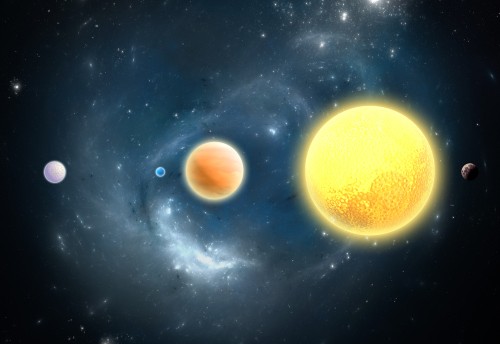The discovery of a seventh planet around the dwarf KIC 11442793 could be the record number of planets discovered around a single sun. This is according to two separate studies published this week.

The discovery of a seventh planet around the dwarf KIC 11442793 could be the record number of planets discovered around a single sun. This is according to two separate studies published this week.
The system bears some similarities to ours, but the orbit of all seven planets is much closer to their host star, which is about 2,500 light years from Earth, than their counterparts in the solar system - in fact, they all enter the orbit between the Earth and the Sun (150 million km). All seven planets are very close to the host star, meaning that the solar system is relatively dense compared to our own.
As mentioned, the system was identified separately by two different teams. One of the identification cases was carried out by a volunteer using a website Planet Hunters . The site was established to allow volunteers to sift through the data from NASA's Kepler space telescope - which was launched to search for planets orbiting distant stars and although already ended its activity due to a malfunction, The data he left behind is still widely used and now the scientists are required to confirm about XNUMX warnings about the possibility of discovering planets by Kepler during his period of activity.
Kepler uses the transit method to discover new planets, which means looking for a dip in the star's light when an alien world passes in front of its host star. But there is simply too much data and it is difficult to examine every light curve, so the European volunteers developed a computer program designed to look for the signature of the transiting planets, with volunteers checking the results to determine if there is a potential planet there.
- In the same topic on the science website:
- First cloud map of an extrasolar planet
- Approaching a thousand planets outside the solar system
- A glimpse into the future of the solar system
- Arthur C. Clark: Why is it important to look for life elsewhere in the universe?
"This is the first seven-planet system that Kepler discovered using the transit method. The identification is quite certain," said Chris Lintott from the University of Oxford, who also co-presents an astronomy program on the BBC, one of the authors of the research based on the Planet Hunters website. While Dr. Lintott's team submitted the study to the journal ASTRONOMY and it was sent for peer review, another team of astronomers from several European countries published a separate article on the discovery of the seventh planet in this system to the Astrophysical Journal.
The new planet is the fifth in distance from the system's parent star and orbits it in a period of almost 125 days. This is a super-Earth, whose radius is 2.8 times greater than that of the Earth. The family currently has two worlds the size of the Earth, three "super Earths", and two larger bodies.
"It really looks like our solar system in a way, with all the smaller planets on the inside and the big planets on the outside. And this is not necessarily what we always see in other solar systems," said Robert Simpson, also from the University of Oxford and one of the authors of the article in the Astrophysical Journal.
Today, scientists do not know of other solar systems with a similar or higher number of planets, but there are two solar systems HD 10180 and GJ 887C that astronomers suspect have more planets, so that their number will equal or exceed 7, and they are being monitored.

4 תגובות
GJ 887C, HD10180...
Why not start giving at least interesting systems catchy names?
You translated and I didn't understand where GJ 887C came from, which I've never heard of
Perhaps we meant the GJ 667 C system which has 5 plus 2 unconfirmed ones
There is one more system that has 7 planets of HD10180 but there are 2 more that are not confirmed yet
Simply amazing but the edge for discovering planets has increased and now stands at 1028 !! Not long ago it was 999
Fascinating, interesting and intriguing..I just saw on the official website and immediately searched on Google for an article in Hebrew on the subject..